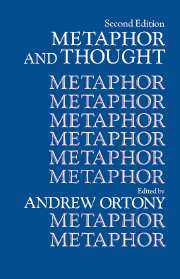Book contents
- Frontmatter
- Contents
- List of contributors
- Preface to the second edition
- Preface to the first edition
- 1 Metaphor, language, and thought
- METAPHOR AND MEANING
- METAPHOR AND REPRESENTATION
- METAPHOR AND UNDERSTANDING
- 14 Psychological processes in metaphor comprehension and memory
- 15 The interpretation of novel metaphors
- 16 The role of similarity in similes and metaphors
- 17 Images and models, similes and metaphors
- 18 How metaphors work
- 19 Metaphor and irony: Two levels of understanding
- METAPHOR AND SCIENCE
- METAPHOR AND EDUCATION
- References
- Author index
- Subject index
15 - The interpretation of novel metaphors
Published online by Cambridge University Press: 05 June 2012
- Frontmatter
- Contents
- List of contributors
- Preface to the second edition
- Preface to the first edition
- 1 Metaphor, language, and thought
- METAPHOR AND MEANING
- METAPHOR AND REPRESENTATION
- METAPHOR AND UNDERSTANDING
- 14 Psychological processes in metaphor comprehension and memory
- 15 The interpretation of novel metaphors
- 16 The role of similarity in similes and metaphors
- 17 Images and models, similes and metaphors
- 18 How metaphors work
- 19 Metaphor and irony: Two levels of understanding
- METAPHOR AND SCIENCE
- METAPHOR AND EDUCATION
- References
- Author index
- Subject index
Summary
Paivio concluded his chapter in the first edition of this collection with the lament that much of the psychological research on metaphor had not been directed at really fundamental problems in the area. In the last paragraph, he wrote:
Such work might require the systematic development of a large pool of novel metaphors that vary in type, difficulty, concreteness, and whatever other dimensions may seem relevant. It may demand systematic extensions of some of the traditional paradigms that have been developed in verbal memory and language research. It would require detailed factual information about precisely how people respond to a novel metaphorical expression.
The present chapter describes a step toward redressing this lack of relevant research.
The particular issues I am addressing involve the last point raised by Paivio and Walsh, namely, the nature of the speaker's response to a novel metaphor. However, I want to go further than just determining the facts of what interpretation is provided by the native speaker to a novel metaphorical utterance and suggest that in order to evaluate such facts, we must examine the following general question: To what extent is the interpretation of a metaphorical expression (or at least the most probable interpretation) predictable on the basis of the linguistic properties of the utterance alone? There are several subquestions: If the metaphorical utterance is given out of context, do speakers agree on the most likely interpretation?
- Type
- Chapter
- Information
- Metaphor and Thought , pp. 329 - 341Publisher: Cambridge University PressPrint publication year: 1993
- 18
- Cited by



